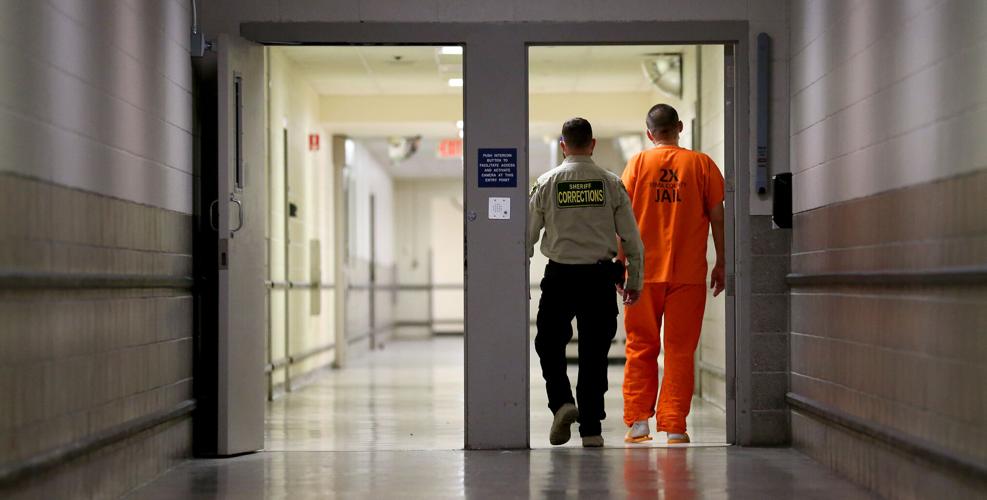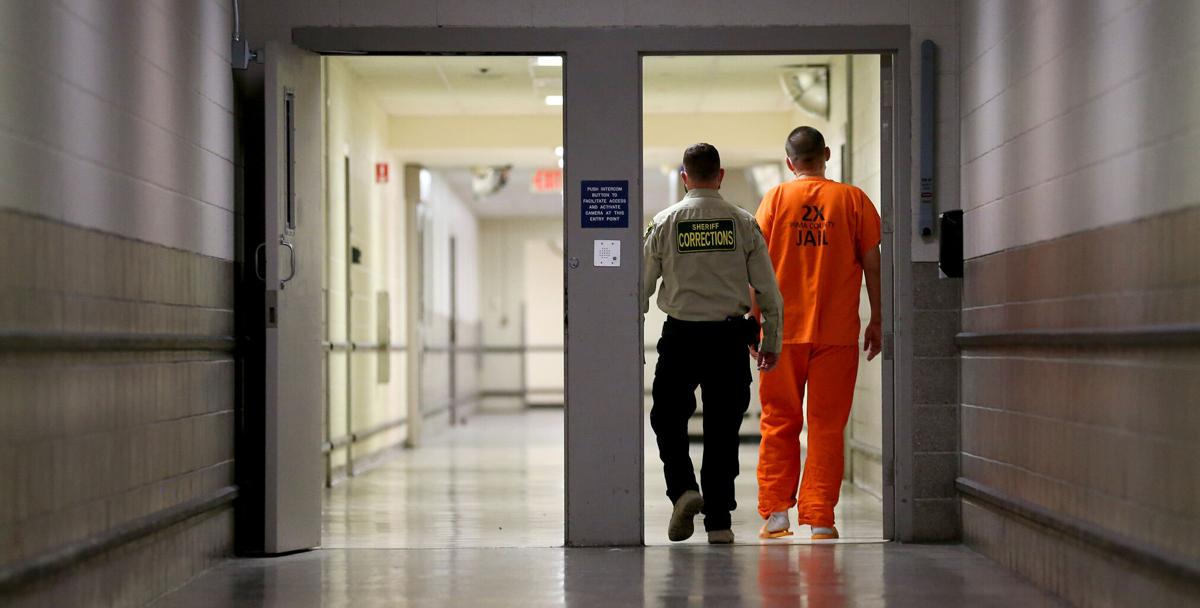Pima County is teaming up with the YWCA of Southern Arizona to address racial and ethnic inequities in the criminal-justice system, thanks to a new $500,000 grant from the John D. and Catherine T. MacArthur Foundation.
This is the foundation's fourth round of funding as part of the Safety and Justice Challenge, bringing its total investment in Pima County up to $4.3 million since the county was selected to participate in 2015 toward the goal of significantly reducing the number of people in its jail.
Since 2016, Pima County's jail population has dropped by 9.2%.
In 2019, Black people represented 12% of the Pima County jail's average daily population, according to data provided by the SJC, but made up just 4.2% of the county's overall population, according to U.S. census data.
The same sources showed that Hispanic or Latino people made up 45% of the jail's average daily population, compared to 37.8% of the county's population; and that Native and Indigenous people represented 6% of the jail's population but 4.4% of the county's population.
While the pandemic saw a push to get people out of jails, which were a vector for the spread of COVID-19, the people left behind were often people of color, which exposes racial disparities that have long existed in the criminal justice system, according to the MacArthur Foundation.
The Safety and Justice Challenge is a $300 million national initiative to reduce over-incarceration and rethink the way America uses jails. Pima County joins Philadelphia, New Orleans and Cook County, Illinois, in this racial equity group for the next two years.
The new round of funding will provide Pima County's Justice Services Department and the YWCA with training and technical help to gather lived experiences of people of color who have been arrested, prosecuted or incarcerated.
One advocate has
a personal stake
Selso Villegas, a member of the Tohono O'odham Nation, has been involved in the county's Safety and Justice Challenge community collaborative for years.
He's been working to address the overrepresentation of Native and Indigenous people in the jail through his position as tribal liaison. He's also part of a national SJC leadership committee that will look at effective ways to reduce the number of Native and Indigenous people who are arrested or incarcerated.
Villegas says he got involved because of how his family has been affected by the criminal-justice system.
"My daughter has addiction issues and has been on the streets for a long time," Villegas said. "When she was younger, I took custody of her three sons. One had fetal alcohol syndrome disorder. "
Two of Villegas' three grandsons have spent time in jail and prison, with one of them starting out in the juvenile justice system.
"I try to relate to people off the reservation and on the reservation and advocate for them," Villegas said.
He said his recent project has been urging tribal members to resolve their warrants for failing to appear in court.

Selso Villegas, center, a Tohono O'odham tribal member, has been working to address the overrepresentation of Native and Indigenous people in Pima County's jail. Here, he is shown accepting a Martin Luther King Community Service Award in 2017.
"I walk up to people and ask if they have failure-to-appear warrants and want to quash them," Villegas said, adding that the pandemic restricted his ability to reach people on a larger scale through outreach events. "Some people get offended and some don't. But at least two people that I've talked to have gone to the court system to quash their warrants."
Villegas, who works as a water resource director for the tribe, said that on tribal lands, communication and transportation are longtime barriers to members being able to appear in court.
A lack of behavioral health services that address tribal culture is also part of the problem, with many members not being able to find the right kind of help, he said.
"Our tribe has a lot of facilities to deal with the issues we're having, but what we don't have is the one-to-one relationship with a social worker. We don't have that capacity, because 60 miles out and back every day is not an incentive for employment," Villegas said. "We haven't been able to hold people, so we have a lot of positions that are open. It's hard to get people motivated to work in a society that's very different than mainstream."
Villegas said tribal members have suffered from decades of stereotyping that they're lazy drug- and alcohol-addicted people, but that the historical trauma Native and Indigenous people were subjected to is often left unsaid. He looks forward to trying to find ways to help other American Indians.
"I just want to help, and help my grandchildren. As an elder, they're all my grandchildren," Villegas said. "It may not work right away and it may take a long time to make a change. I'm a realist, too."
Numbers can
tell a narrative
SJC participants are embarking on the racial equity work with their eyes wide open, said Pima County's director of justice services, Kate Vesely.
"It's going to be challenging. There's no magic wand. We're going to have to do the dirty work," she said. "The biggest challenge will be breaking out of our comfort areas. It's uncomfortable to look at systems through these lenses. It's uncomfortable to view disparities that have long existed."
A big part of the work will be listening to people about the impact incarceration has on families and the community, particularly when it comes to historically disadvantaged groups, Vesely said. Another will be understanding the associated data on a higher level.
"The snapshot of the jail doesn't really tell a story. We don't know the ratios of how demographics are being arrested or held at initial appearance, or the length of time in custody for certain demographics versus others," Vesely said. "We need to do a better job of telling the story of the data in our community."

Vesely
The county's Justice Services Department will analyze data from arrest all the way through the case's disposition, whether that be diverting people to treatment instead of arresting them or sending them to jail, or sentencing them to time in jail or prison. It will connect county and local systems that haven't been synced up, including probation, courts, the County Attorney's and Public Defender's offices, and the jail.
Creation of a racial equity data hub will provide evidence of where disparities exist, so a long-term strategy can be developed, Vesely said.
She's excited to work with the YWCA, calling it "the model of community engagement" that's ready to build on its trust with residents and have honest conversations about what's being done wrong on a racial equity level.
"Race work inherently is uncomfortable. Being able to connect emotionally with a community that feels unseen and not represented means we'll be able to hopefully build trust and a system that works," Vesely said.
'It's not just
about intentions'
Justice Services will partner with the YWCA's Pima County Teen Court to examine the school-to-prison pipeline.
The pipeline refers to school discipline policies and practices that remove students from the classroom and push them out of school, often resulting in them ending up in the juvenile and criminal-justice systems for minor offenses.
"With the addition of Teen Court as part of our intervention and work with the community, there's an opportunity to deepen the engagement with directly impacted people and their families," said Liane Hernandez, YWCA of Southern Arizona's director of women's leadership, empowerment and wellness center.
Teen Court is a peer-led juvenile court diversion program that uses the principles of restorative justice, which emphasize accountability and making amends rather than punishment, and positive development and community-service-based learning to lower risks of repeat crimes. Teen Court was created in 1995 to respond to overrepresentation of minorities in the juvenile justice system. To date, 8,000 adolescents have gone through the program here, and 60% of its participants identify as people of color.
The plan is to hire teens who have completed Teen Court to co-facilitate community engagement workshops along with adults.
"We have amazing adult facilitators, but they're not youth who have been arrested and come through that hearing and come out the other side to success," said Teen Court's director, Kate Spaulding. "Their voices need to be heard at all aspects."

Those working on the equity effort will include, from left, Magdalena Verdugo, chief executive officer of the YWCA; Liane Hernandez, director of the YWCA's wellness center; W. Kate Spaulding, director of Pima County Teen Court; and Lara Ruggles, director of development and marketing at the YWCA of Southern Arizona.
Spaulding said she envisions teens coming up with ideas for the project that she and her colleagues wouldn't have imagined. Including them in the challenge will create opportunities for mentorship, and also will provide the teens with job and leadership skills while paying them for their time.
"So much of this work is healing and what we bring to it emotionally," said Lara Ruggles, YWCA's director of development and marketing.
To help make sure representative voices are at the table, the YWCA will distribute five micro-grants of $10,000 each to local groups and nonprofits already involved in racial equity work. It will also lay the groundwork to eventually create a racial justice center.
Hernandez said they aim to "get to the root of issues" and to design interventions.
"We need to learn ... so that we’re not building systems that are causing greater harm," Hernandez said. "It's not just about intentions, it's about the impact of the work."
Pandemic a time
for reflection
Collaboration by the county's various stakeholders has impressed the MacArthur Foundation, said the foundation's senior program officer, Bria Gillum.
The effort has been mindful not just of the people arrested or jailed, but also of victims of crimes, as well as criminal-justice workers and service providers, she said. "We've really seen it blossom over the last six years. This will lead to the sustainability of Pima County's criminal-justice reform efforts."
It's challenging to try to figure out how to address racial inequities in criminal justice when those inequities have existed for centuries, Gillum said. "These are difficult questions to solve in a short period of time," she said.
The pandemic gave communities an opportunity to think about why so many people in jail are being held on low-level offenses and to consider ways to release them back into society when they don't prove a risk, Gillum said. That led to dramatic decreases of overall jail populations but exposed problems that still exist.

"The people left behind in jail continue to be people of color, lots of time for felony charges," Gillum said. "We need to be asking, 'Why do we tend to charge people of color with felony offenses? Do we need to reevaluate how we're charging people of color?'"
It's also time to reflect on whether people who lack affordable and stable housing or who don't have access to the services they need are being arrested and incarcerated at a higher rate, Gillum said. She said Pima County has shown it's ready to do that.
"Pima County is comfortable being uncomfortable," Gillum said. "The time is right to be thinking more critically about the disproportionalities we're seeing in the criminal-justice system and coming up with real, concrete solutions."









